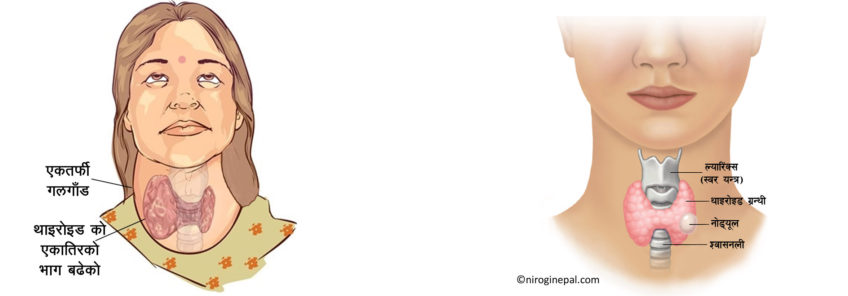
- Grave’s disease (overproduction of thyroid hormone because of immune system disorder).
- Overactive thyroid nodules (lumps in the thyroid gland),
- Thyroiditis (inflammation of the thyroid),
- Taking too much synthetic thyroid hormone.
- Loss of weight
- Frequent bowel movement
- Intolerance to heat
- Excessive sweating
- Anxiety, nervousness and irritability
- Fatigue, muscle weakness
- Faster and irregular heartbeat
- Swollen neck
- Mood changes
- Menstrual irregularity
- Problem with sleeping
- Thinning of skin
- Anti-thyroid medicines: Carbimazole, propylthiouracil. They block the formation of new thyroid hormones in thyroid gland.
- Radioiodine therapy: You are given oral capsules or drinks that contain radioactive iodine. These iodines are taken up by the overactive thyroid gland and permanently destroy the thyroid gland. You will cured of hyperthyroidism but will develop hypothyroidism for which you will have to take supplemental thyroid hormone.
- Thyroid surgery: Removal of part of your thyroid gland. You will need thyroid supplementation after removal of the thyroid.
- Beta blocker are used to manage the heart rate.
- Treatment of eye problems and other cardiac symptoms is also done accordingly.
- You are asked to come for regular follow up.
- Hashimoto’s disease- this is the most common cause of hypothyroidism in developed world. In this condition your immune system attacks your thyroid gland causing destruction of thyroid cells. As a result, thyroid gland cannot make enough thyroid hormone.
- Iodine deficiency: This is more common in certain parts of world where salt is not iodized. It presents as enlargement of thyroid gland (goitre) and signs and symptoms of hypothyroidism. Eating iodized salt can prevent this form of hypothyroidism. However, taking too much iodine can cause hypothyroidism.
- Treatment of hyperthyroidism with radioactive iodine or surgical removal of thyroid gland
- Certain medication specially Lithium
- Radiation therapy to the neck
- Other : congenital hypothyroidism, diseases of pituitary gland that stimulates thyroid gland to produce hormones.
- Weight gain
- Fatigue, decreased sweating
- Joint, muscle pain
- Heavy or irregular menstrual period
- Depression
- Slow heartbeat
- Dry skin, hair
- Cold intolerance
- Constipation
- Impaired memory
The thyroid is a gland in the middle of the lower neck around Adam’s Apple. It is the gland that makes thyroid hormones, thyroxine (T4) and triiodothyronine (T4). Thyroid hormones determine your body’s metabolism, regulates heart rate and controls body temperature. The production of these hormones (T3, T4) by thyroid gland in turn is controlled by another hormone (TSH) produced by pituitary gland – the master gland of the body. Disease of thyroid gland can be classified in two categories. If your thyroid gland makes too much of thyroid hormone, it is called hyperthyroidism. When your thyroid gland makes less than normal amount of hormone, it is called hypothyroidism. There are many conditions that cause hyper or hypothyroidism.
Hyperthyroidism
In this condition your thyroid gland is producing more thyroid hormone than your body needs. This will result in increased metabolic rate, increased cardiovascular activity, excessive heat production etc.The cells of thyroid gland increase in size and also change their structure. It is more common in women than men and prevalence is greater in old age.
Causes
The common cause of hyperthyroidism are:
Symptoms
Common symptoms of hyperthyroidism are:
Uncontrolled and untreated hyperthyroidism can lead to serious complications like arrhythmia, heart failure, weak bone and eye problems. Occasionally, symptoms may severely intensify in very short period (thyroid crisis) which could be life threatening.
Diagnosis
Hyperthyroidism is diagnosed based on the symptoms and high levels of thyroid hormones in the blood. A high T3 or T4 and low TSH establishes the diagnosis of hyperthyroidisms. In order to identify the underlying causes your doctor will recommend an ultrasound of thyroid gland and few other blood tests looking for antibodies.
Treatment
There are different options available for treatment of hyperthyroidism. Depending on your situation your doctor will prescribe one or more of the following treatment modalities:
Hypothyroidism
Hypothyroidism is a condition where your thyroid gland is not producing enough thyroid hormone to meet your body needs. This slows down all of your body’s activities.
Causes
Symptoms
Symptoms develop gradually and become worse over months or years as the level of thyroxine in the body gradually falls. Some common symptoms of hypothyroidism are:
Poorly controlled or untreated hypothyroidism may lead to serious complications including heart problems, hypothyroid coma, infertility, peripheral neuropathy, mental health issues. etc.
Diagnosis
Symptoms of hypothyroidism and low level of thyroid hormone in your blood makes the diagnosis of hypothyroidism.
Treatment
It is treated with medicine. Your doctor will prescribe you thyroxine tablets to replace the deficiency of thyroxine hormone.



Send us your feedback on this article